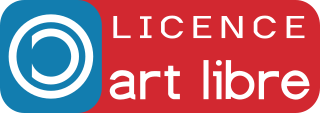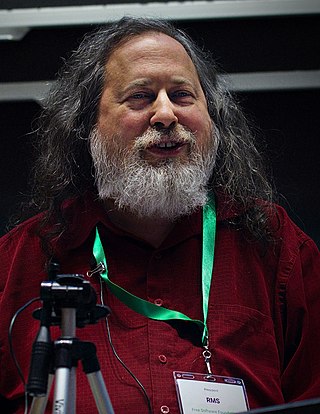Related Research Articles

Free software, libre software, or libreware is computer software distributed under terms that allow users to run the software for any purpose as well as to study, change, and distribute it and any adapted versions. Free software is a matter of liberty, not price; all users are legally free to do what they want with their copies of a free software regardless of how much is paid to obtain the program. Computer programs are deemed "free" if they give end-users ultimate control over the software and, subsequently, over their devices.
The free software movement is a social movement with the goal of obtaining and guaranteeing certain freedoms for software users, namely the freedoms to run, study, modify, and share copies of software. Software which meets these requirements, The Four Essential Freedoms of Free Software, is termed free software.

GNU is an extensive collection of free software, which can be used as an operating system or can be used in parts with other operating systems. The use of the completed GNU tools led to the family of operating systems popularly known as Linux. Most of GNU is licensed under the GNU Project's own General Public License (GPL).

The GNU Project is a free software, mass collaboration project announced by Richard Stallman on September 27, 1983. Its goal is to give computer users freedom and control in their use of their computers and computing devices by collaboratively developing and publishing software that gives everyone the rights to freely run the software, copy and distribute it, study it, and modify it. GNU software grants these rights in its license.

Open-source software (OSS) is computer software that is released under a license in which the copyright holder grants users the rights to use, study, change, and distribute the software and its source code to anyone and for any purpose. Open-source software may be developed in a collaborative, public manner. Open-source software is a prominent example of open collaboration, meaning any capable user is able to participate online in development, making the number of possible contributors indefinite. The ability to examine the code facilitates public trust in the software.

The Free Art License (FAL) is a copyleft license that grants the right to freely copy, distribute, and transform creative works except for computer hardware and software, including for commercial use.

Within the free software and the open-source software communities there is controversy over whether to refer to computer operating systems that use a combination of GNU software and the Linux kernel as "GNU/Linux" or "Linux" systems.

Free and open-source software (FOSS) is a term used to refer to groups of software consisting of both free software and open-source software, where anyone is freely licensed to use, copy, study, and change the software in any way, and the source code is publicly available so that people are encouraged to improve the design of the software. This is in contrast to proprietary software, where the software is under restrictive copyright or licensing and the source code is hidden from the users.
Alternative terms for free software, such as open source, FOSS, and FLOSS, have been a controversial issue among free and open-source software users from the late 1990s onwards. These terms share almost identical licence criteria and development practices.

Richard Matthew Stallman, also known by his initials, rms, is an American free software movement activist and programmer. He campaigns for software to be distributed in such a manner that its users have the freedom to use, study, distribute, and modify that software. Software that ensures these freedoms is termed free software. Stallman launched the GNU Project, founded the Free Software Foundation (FSF) in October 1985, developed the GNU Compiler Collection and GNU Emacs, and wrote all versions of the GNU General Public License.
OurProject.org (OP) is a web-based collaborative free content repository. It acts as a central location for the construction and maintenance of social/cultural/artistic projects, providing web space and tools, and focusing in free knowledge. It claims to extend the ideas and methodology of free software to social areas and free culture in general. Since September 2009, Ourproject is under the Comunes Association umbrella, and gave birth to the Kune collaborative social network for groups.
The Free Software Foundation (FSF) is a 501(c)(3) non-profit organization founded by Richard Stallman on October 4, 1985, to support the free software movement, with the organization's preference for software being distributed under copyleft terms, such as with its own GNU General Public License. The FSF was incorporated in Boston, Massachusetts, United States, where it is also based.

According to the Free Software Foundation Latin America, Linux-libre is a modified version of the Linux kernel that contains no binary blobs, obfuscated code, or code released under proprietary licenses. In the Linux kernel, they are mostly used for proprietary firmware images. While generally redistributable, binary blobs do not give the user the freedom to audit, modify, or, consequently, redistribute their modified versions. The GNU Project keeps Linux-libre in synchronization with the mainline Linux kernel.
Canaima GNU/Linux is a free and open-source Linux distribution that is based on the architecture of Debian. It was created as a solution to cover the needs of the Venezuelan Government as a response to presidential decree 3,390 that prioritizes the use of free and open source technologies in the public administration. On 14 March 2011, Canaima was officially established as the default operating system for the Venezuelan public administration.

GNU Health is a free/libre health and hospital information system with strong focus on public health and social medicine. Its functionality includes management of electronic health records and laboratory information management system.
GNOME Project is a community behind the GNOME desktop environment and the software platform upon which it is based. It consists of all the software developers, artists, writers, translators, other contributors, and active users of GNOME. It is no longer part of the GNU Project.

Parabola GNU/Linux-libre is a free and open-source Linux distribution based on Arch Linux and Arch Linux ARM for the x86-64, i686, and ARMv7 architectures. It is distinguished from other Arch-based distributions by offering only free software. It includes the GNU operating system components common to many Linux distributions and the Linux-libre kernel instead of the generic Linux kernel. Parabola is listed by the Free Software Foundation as a completely free operating system, true to their Free System Distribution Guidelines.

Framasoft is an education-oriented social network created in November 2001 by Alexis Kauffmann, Paul Lunetta, and Georges Silva. Since 2014, it has been supported by a nonprofit organization of the same name based in Lyon, France. Mainly focused on free software valorisation, it is divided into three main branches of activity based upon a collaborative model: promotion, dissemination and development of free software, enrichment of the free culture movement, and online services.

Luis Falcón Martín is a Spanish computer scientist, physician and free software activist who founded GNU Solidario, an organization focused in education and health. Martín is known for in social medicine and as the author of GNU Health, a health and hospital information management system.
References
- ↑ (in French) April press materials, page 10 (pdf). Retrieved 17 January 2013
- ↑ (in French) Philosophy of GNU project (French translation). Retrieved 17 January 2013
- ↑ (in French) April press materials, page 14 (pdf). Retrieved 17 January 2013
- ↑ (in French) membership FAQ | dues. Retrieved 17 January 2013
- ↑ (in French) schedule of institutional dues. Retrieved 17 January 2013
- ↑ (in French) rms address at Paris-8 on 10 November 1998 Archived 2 September 2012 at the Wayback Machine . Retrieved 17 January 2013
- ↑ (in French) April's successful membership drive (3 June 2009). Retrieved 17 January 2013